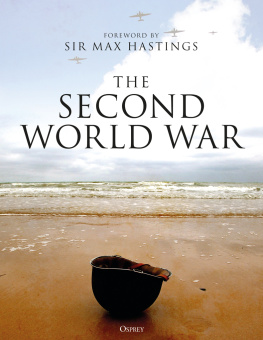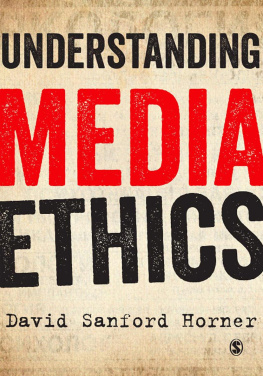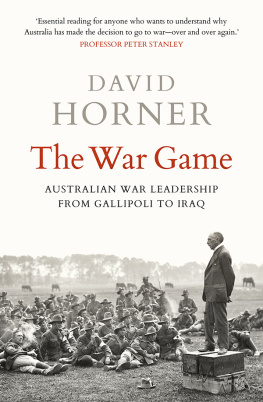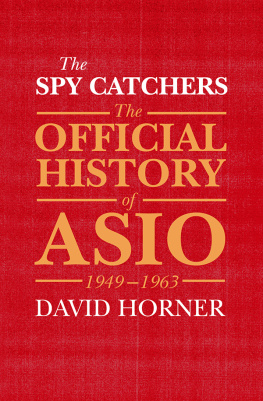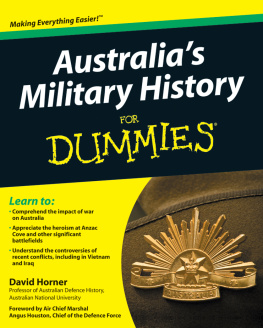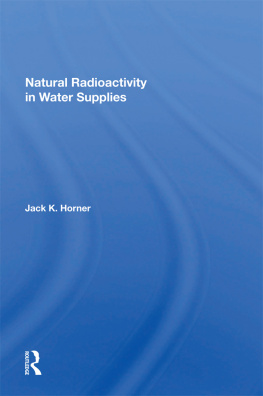David Horner - The Second World War
Here you can read online David Horner - The Second World War full text of the book (entire story) in english for free. Download pdf and epub, get meaning, cover and reviews about this ebook. year: 2018, publisher: Bloomsbury Publishing, genre: History. Description of the work, (preface) as well as reviews are available. Best literature library LitArk.com created for fans of good reading and offers a wide selection of genres:
Romance novel
Science fiction
Adventure
Detective
Science
History
Home and family
Prose
Art
Politics
Computer
Non-fiction
Religion
Business
Children
Humor
Choose a favorite category and find really read worthwhile books. Enjoy immersion in the world of imagination, feel the emotions of the characters or learn something new for yourself, make an fascinating discovery.
- Book:The Second World War
- Author:
- Publisher:Bloomsbury Publishing
- Genre:
- Year:2018
- Rating:4 / 5
- Favourites:Add to favourites
- Your mark:
- 80
- 1
- 2
- 3
- 4
- 5
The Second World War: summary, description and annotation
We offer to read an annotation, description, summary or preface (depends on what the author of the book "The Second World War" wrote himself). If you haven't found the necessary information about the book — write in the comments, we will try to find it.
The Second World War — read online for free the complete book (whole text) full work
Below is the text of the book, divided by pages. System saving the place of the last page read, allows you to conveniently read the book "The Second World War" online for free, without having to search again every time where you left off. Put a bookmark, and you can go to the page where you finished reading at any time.
Font size:
Interval:
Bookmark:


OSPREY PUBLISHING
c/o Bloomsbury Publishing Plc
PO Box 883, Oxford, OX1 9PL, UK
Or
c/o Bloomsbury Publishing Inc.
1385 Broadway, 5th Floor, New York, NY 10018, USA
E-mail:
www.ospreypublishing.com
This electronic edition published in 2018 by Bloomsbury Publishing Plc
OSPREY is a trademark of Osprey Publishing Ltd
First published in Great Britain in 2018.
Abridged from the previously published: Essential Histories 18: The Second World War (1): The Pacific, Essential Histories 35: The Second World War (2): Europe 19391943, Essential Histories 30: The Second World War (3): The War at Sea, Essential Histories 48: The Second World War (4): The Mediterranean 19401945, Essential Histories 24: The Second World War (5): The Eastern Front 19411945, and Essential Histories 32: The Second World War (6): Northwest Europe 19441945.
Osprey Publishing Ltd, 2018
Foreword Copyright Max Hastings, 2003
All rights reserved
You may not copy, distribute, transmit, reproduce or otherwise make available this publication (or any part of it) in any form, or by any means (including without limitation electronic, digital, optical, mechanical, photocopying, printing, recording or otherwise), without the prior written permission of the publisher. Any person who does any unauthorised act in relation to this publication may be liable to criminal prosecution and civil claims for damages.
A catalogue record for this book is available from the British Library.
ISBN: 978-1-4728-2850-7 (HB)
ISBN: 978-1-4728-3392-1 (eBook)
ISBN: 978-1-4728-3394-5 (ePDF)
ISBN: 978-1-4728-3395-2 (XML)
Maps by The Map Studio
Front cover images: D-Day anniversary commemorations: (top) Dakota aircraft flypast seen from Utah beach on June 4, 2014 (Peter Macdiarmid/Getty Images); (bottom) A US helmet photographed on Omaha beach, June 6, 2011. (KENZO TRIBOUILLARD/AFP/Getty Images)
Osprey Publishing supports the Woodland Trust, the UKs leading woodland conservation charity. Between 2014 and 2018 our donations are being spent on their Centenary Woods project in the UK.
To find out more about our authors and books visit www.ospreypublishing.com. Here you will find our full range of publications, as well as exclusive online content, details of forthcoming events and the option to sign up for our newsletters. You can also sign up for Osprey membership, which entitles you to a discount on purchases made through the Osprey site and access to our extensive online image archive.
CONTENTS
FOREWORD
By Sir Max Hastings
The Second World War was the greatest conflict in human history, and today must rank as its most exhaustively studied event. Hundreds of millions of individuals who lived through the period, whether in Nanking or Nuremburg, Leningrad or Luzon, endured a length and depth of suffering mercifully unknown to our generation, even among peoples who live in troubled regions of the world. Thus, personal memoirs of the war retain an enduring fascination, whether they tell the stories of soldiers or Holocaust survivors, maquisards or Chindits, bomber pilots or housewives.
Beyond personal memoirs, of course, there are vast collective issues. Some of the finest minds of the past half century have explored the phenomenon of Nazi Germany. None has yet produced a wholly satisfactory explanation of how a civilized, educated people could place itself in thrall to a coterie of uncultured gangsters, and under its tutelage embark upon institutionalized murder on a vast scale.
Too much modern research, especially in the United States, focuses upon the Holocaust in isolation. The Nazis singled out Jewish people for extinction, but they also carried out mass killings among all manner of other peoples, notably in Eastern Europe. Modern German research, for instance, highlights the fact that operational planning for the 1941 invasion of the Soviet Union, in which the German General Staff was fully complicit, scheduled millions of Ukrainians and Russians for starvation before the campaign was fired. Their deaths were indispensable, to allow the grain and raw materials which supported them to be shipped to Germany.
Insofar as any struggle in history has been waged between good and evil, the Western Allies could claim the right to represent virtue, in their campaign to liberate Europe. However, the issue is hugely complicated by the participation of the Soviet Union in the Grand Alliance. In 1941, Stalins regime had been responsible for the deaths of many more innocents than the Nazis. This fact caused moral confusion to thoughtful British and American people at the time, and continues to do so today.
Militarily, the struggle between the armies of Germany and the Soviet Union dominated the war. Some 29 million Soviet citizens died between 1941 and 1945. The Red Army was responsible for about 80 percent of all casualties inflicted upon the German nation. By contrast, the peoples of the United States, Britain, and France lost fewer than a million dead in Europe. Though the Allied bomber offensive against Germany played a significant part in weakening Hitlers empire, and killed some 600,000 Germans, mostly civilians, Allied land forces fought in Northwest Europe only for the last 11 months of the war. Their campaign never absorbed much more than one-third of the number of German troops committed on the Eastern Front. The dominant Soviet role in destroying the Nazis gravely handicapped the Anglo-Americans in resisting Stalinist imperialism in Eastern Europe in 1945. Soviet participation among the judges at the postwar Nuremburg trials was ironic. While it did not in the least diminish the guilt of the Germans indicted, all those concerned knew that a host of Stalins minions could readily have been convicted on the same charges.
By far the bloodiest theater in Asias war was China. A large part of the Japanese Army was committed there until August 1945. Battlefield collisions between Chinese and Japanese forces were spasmodic and militarily unsophisticated. Americas insistence that Chinese leader Chiang Kai-shek should be treated as a partner in the councils of the Grand Alliance was a political gesture, unsupported by any substantial Chinese military contribution to Allied victory. However, the Japanese occupiers killed untold millions of Chinese civilians by murder and starvation.
Americas campaign against Japan was overwhelmingly naval, and dominated by air power. For more than three years, the United States conducted a painful struggle to translate its armed might westward across the huge expanses of the Pacific, through a series of amphibious landings on remote islands, and fleet actions against the Japanese Navy of a kind unknown in the European Theater. Japans surrender was finally precipitated by the dropping of two atomic weapons, an American act which inaugurated a frightening new age, and continues to provoke bitter controversy. It is useful to recall that earlier American air attacks on Japanese cities had killed far more people with conventional incendiary weapons than the nuclear devices unleashed upon Hiroshima and Nagasaki.
Some historians have argued that the outcome of the Second World War was inevitable, given the vastly superior economic power of the Grand Alliance, measured against that of the Axis. Yet this begs the question. Only Britain and France entered the war in 1939, to honor guarantees to Poland. For some years during and after the conflict, the British flattered themselves that they had somehow defeated Hitler in 1940. It is undoubtedly true that the Battle of Britain averted a cross-Channel invasion, which Hitler would have undertaken, had he perceived the opportunity for a quick, easy victory. This the Royal Air Force denied him.
Font size:
Interval:
Bookmark:
Similar books «The Second World War»
Look at similar books to The Second World War. We have selected literature similar in name and meaning in the hope of providing readers with more options to find new, interesting, not yet read works.
Discussion, reviews of the book The Second World War and just readers' own opinions. Leave your comments, write what you think about the work, its meaning or the main characters. Specify what exactly you liked and what you didn't like, and why you think so.

